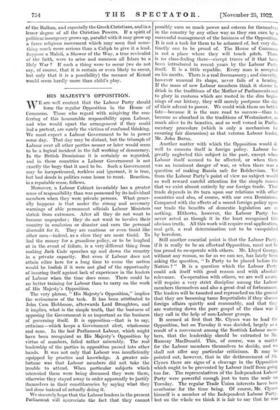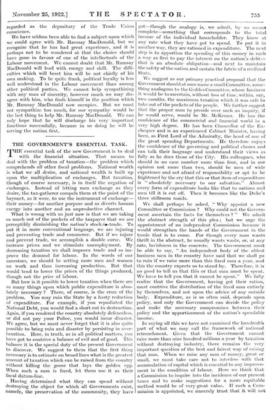HIS MAJESTY'S OPPOSITION.
WE are well content that the Labour Party should form the regular Opposition in the House of Commons. Those who regard with misgiving the con- ferring of this honourable responsibility upon Labour; and who would upset the arrangement if they could find a pretext, are surely the victims of confused thinking. We must expect a Labour Government to be in power some day. That day may be distant, but the triumph of Labour over all other parties sooner or later would seem to be a logical incident in the full working of democracy. In the British Dominions it is certainly so regarded, and in those countries a Labour Government is not exactly the bogy that it used to be. Such a Government may be inexperienced, reckless and ignorant, it is true, but bad deeds in politics come home to roost. Reaction, in a reputable sense, follows.
Moreover, a Labour Cabinet invariably has a greater sense of responsibility than was possessed by its individual members when they were private persons. What gener- ally happens is that under the strong and necessary warnings of able permanent officials Labour Ministers shrink from extremes. After all they do not want to become unpopular ; they do not want to involve their country in confusion or disaster and earn the personal discredit for it. They are cautious or even timid like other men—indeed, as a class they are more timid. To find the money for a grandiose policy, or to be laughed at in the event of failure, is a very different thing from making Jack Cade speeches up and down the country in a private capacity. But even if Labour does not attain office here for a long time to come the nation would be foolish if it were not glad of the opportunity of insuring itself against lack of experience in the leaders of Labour when the time does come. There could be no better training for Labour than to carry on the work of His Majesty's Opposition.
The very phrase, " His Majesty's Opposition," implies the seriousness of the task. It has been attributed to John Cam Hobhouse, afterwards Lord Broughton, and it implies, what is the simple truth, that the business of opposing the Government is as important as the business of governing itself. It is opposition—that is to say, criticism—which keeps a Government alert, wholesome and sane. In the last Parliament Labour, which might have been recognized as His Majesty's Opposition by virtue of numbers, failed rather miserably. The real leadership of the parties in opposition passed into other hands. It was not only that Labour was insufficiently equipped by practice and knowledge. A greater mis- fortune was that Labour members did not take the trouble to attend. When particular subjects which interested them were being discussed they were there, otherwise they stayed away in order apparently to justify themselves in their constituencies by saying what they had done instead of actually doing it.
We sincerely hope that the Labour leaders in the present Parliament will appreciate the fact that they cannot possibly earn so much power and esteem for themselves in the country by any other way as they can earn by a successful management of the business of the Opposition. It is not a task for them to be ashamed of, but very dis- tinctly one to be proud of. The House of Commons is not a place where they will touch pitch. There is no class-feeling there—except traces of it 'that have been introduced in recent years by the Labour Party itself. It is a little republic. Every man is accepted on his merits. There is a real freemasonry; and sincerity, however unusual its shape, never fails of a hearing. If the mass of new Labour members think it shame to drink in the traditions of the Mother of Parliaments and to glory in customs which are rooted in the dim begin- nings of our history, they will merely postpone the day of their advent to power. We could wish them no better fate—because it is the sure road to success—than to become as absorbed in the traditions of Westminster, as much alive to its beauties, and as well versed in Parlia- mentary procedure (which is only a mechanism for ensuring fair discussion) as that veteran Labour leader, Mr. John Burns.
Another matter with which the Opposition would dc well to concern itself is foreign policy. Labour has greatly neglected this subject in the past, except when Labour itself seemed to be affected, or when there was an imminent danger of war, or when there was a question of making Russia safe for Bolshevism. Yet from the Labour Party's point of view no subject would so well reward careful attention for the simple reason that we exist almost entirely by our foreign trade. That trade depends in its turn upon our relations with other countries and also, of course, with our own Dominions. Compared with the effects of a sound foreign policy upon our trade the benefits of domestic legislation are as nothing. Hitherto, however, the Labour Party has never acted as though it in the least recognized this obvious truth. All this work will require real application, real grit, a real determination not to be vanquished by boredom.
Still another essential point is that the Labour Party, if it is really to be an effectual Opposition, must not be too proud to co-operate with others. Mr. Lloyd George, without any reason, so far as we can see, has lately been asking the question, " Is Party to be placed before the Nation ? " It is a question which the Labour Party could ask itself with good. reason and with absolute relevance. Co-operation with others, we are well aware, will require a* very strict discipline among the Labour members themselves and also a great deal of forbearance. The leaders will be taunted and reproached on the ground that they are becoming tame Imperialists if they discuss foreign affairs quietly and reasonably, and that they are watering down the pure gospel of the class war if they call in the help of non-Labour groups.
It seemed at first that Mr. Clynes was to lead the Opposition, but on Tuesday it was decided, largely as a result of a movement among the Scottish Labour mem- bers, that the leadership should be entrusted to Mr. Ramsay MacDonald. This, of course, was a matter for the Labour members themselves to decide, and we shall not offer any particular criticisms. It may be pointed out, however, that in the dethronement of Mr. Clynes there are signs of a cleavage in the Opposition which ought to be prevented by Labour itself from going too far. The representatives of the Independent Labour Party were powerful enough just to turn the scale on Tuesday. The regular Trade Union interests have been overborne for the time being. Of course, Mr. Clynes himself is a member of the Independent Labour Party, but on the whole we think it is fair to say that he was regarded as the depositary of the Trade Union conscience.
We have seldom been able to find a subject upon which we could agree with Mr. Ramsay MacDonald, but we recognize that he has had great experience, and it is perhaps not to be wondered at that the choice should have gone in favour of one of the intellectuals of the Labour movement. We cannot doubt that Mr. Ramsay MacDonald will lead with energy and skill. The diffi- culties which will beset him will be not chiefly of his own making. To be quite frank, political loyalty is less well understood in the Labour movement than among other political parties. We cannot help sympathizing with any man of sincerity, however much we may dis- agree with him, who finds himself in the position which Mr. Ramsay MacDonald now occupies. But we must not sympathize too much, for our sympathy would be the last thing to help Mr. Ramsay MacDonald. We can only hope that he will discharge his very important functions successfully, because in so doing he will be serving the nation first.











































 Previous page
Previous page